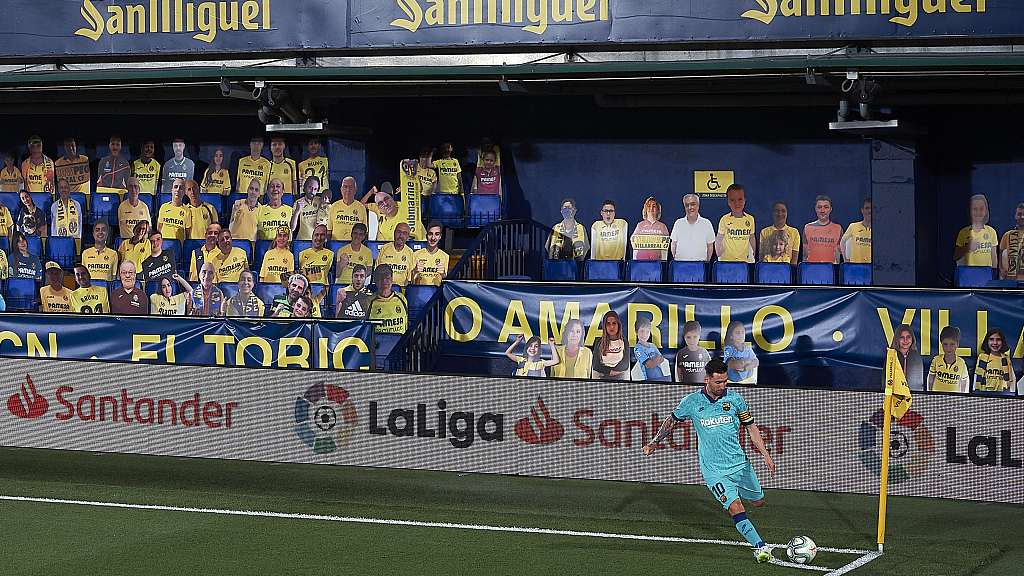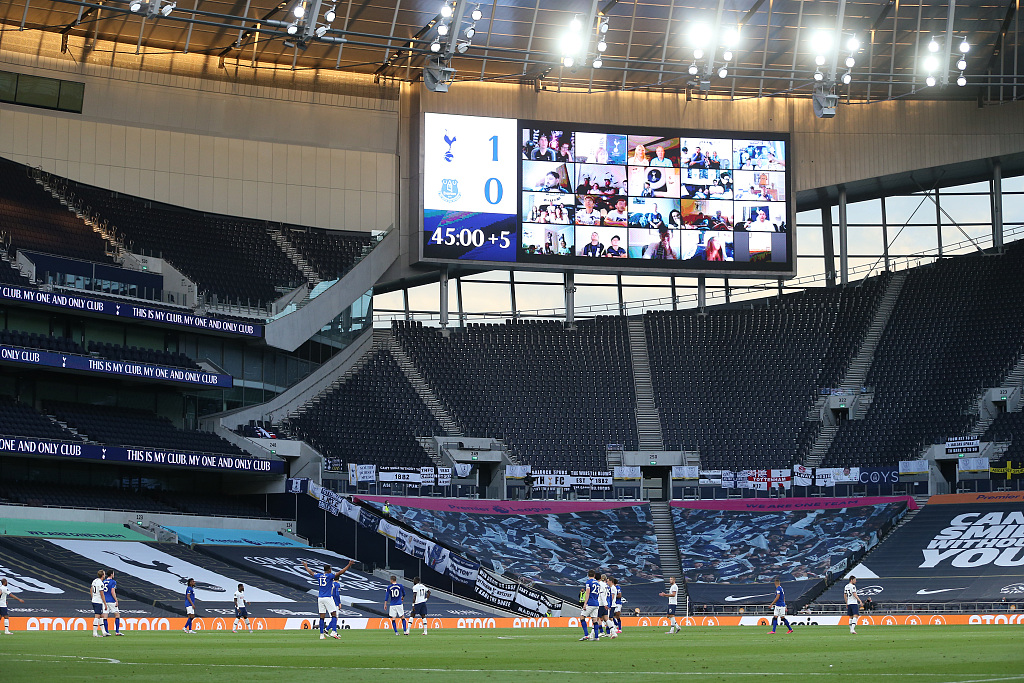
Lionel Messi of Barcelona during the Liga match against Villarreal CF in Villareal, Spain, July 5, 2020. /VCG
Lionel Messi of Barcelona during the Liga match against Villarreal CF in Villareal, Spain, July 5, 2020. /VCG
The novel coronavirus pandemic is likely to cost Europe's top-flight football clubs around 4 billion euros (4.52 billion U.S. dollars) in lost revenue, according to the analysis published by the European Club Association (ECA) on Tuesday.
"The financial impact of COVID-19 on European clubs, as far as we can see now, is already a seismic shock, even with most competitions up and running again," said ECA chief executive Charlie Marshall.
"The financial impact does not stop when the game resumes. Rather, it will continue into the next season and we must take measures to create a more sustainable football industry in the long run."

Cardboard fans are placed in the stadium during the La Liga match between Villarreal CF and FC Barcelona in Villarreal, Spain, July 5, 2020. /VCG
Cardboard fans are placed in the stadium during the La Liga match between Villarreal CF and FC Barcelona in Villarreal, Spain, July 5, 2020. /VCG
European football was brought to a near standstill in March and, although many leagues restarted last month, most had to do so without spectators. This was a particular blow in smaller leagues where clubs are more dependent on gate receipts for their income.
There are more than 700 first division clubs in Europe's 55 national associations, although a recent study by European soccer's governing body UEFA showed that the top 30 of them rake in nearly half of the total revenue.
According to KPMG, Europe's top clubs suffered an estimated 15-30 percent loss in matchday revenue in the 2019-20 campaign due to their home games being played behind closed doors and if health restrictions prevail, longer-term losses can hit even harder.
Marshall said the upcoming transfer window would provide an indication of the state of football's health but that clubs and leagues should take the opportunity to build more sustainably for the future.
"This is imperative as we are still living with COVID-19 and, if nothing else, we have learned that being flexible and prepared for unpredictability is part of our future," he said.

Son Heung-min of Tottenham Hotspur during the Premier League match against Everton FC in London, United Kingdom, July 6, 2020. /VCG
Son Heung-min of Tottenham Hotspur during the Premier League match against Everton FC in London, United Kingdom, July 6, 2020. /VCG
Fewer fans, increased costs 'new normal' for clubs in post-COVID-19 world
Reduction in stadium capacities, improved ventilation systems and mobile payment for tickets and drinks are some of the measures football clubs may have to implement while designing stadiums in the wake of the COVID-19 pandemic.
A study conducted by architecture studio Fenwick Iribarren says future clubs will need to embrace solutions that promote social distancing in venues.
"It is necessary to see how the reduction of capacity is made, how the spaces where people mix are treated. But I think it is a sustainable and salable challenge," said Mark Fenwick, head of Fenwick Iribarren Architects.

General view of Tottenham Hotspur fans on the big screen during the Premier League match between Tottenham Hotspur and Everton FC in London, United Kingdom, July 6, 2020. /VCG
General view of Tottenham Hotspur fans on the big screen during the Premier League match between Tottenham Hotspur and Everton FC in London, United Kingdom, July 6, 2020. /VCG
In order to enforce social distancing, clubs would need to either develop bigger venues with the same number of seats or reduce the capacity, with the latter the more likely solution, leading to a decline in matchday revenue, the study said.
"No touch" solutions, including automatic doors, activation of lights by infrared detection and mobile payment for tickets and drinks are already available but implementing them would be expensive, increasing the cost of hosting matches.
The study also touched upon the need for health screening procedures at stadiums, suggesting the use of facial recognition that links to a health database to identify at-risk individuals.
(With input from Reuters)